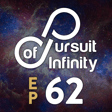
69. Metaphysical Queries: Unveiling Reality's Mysteries II
In this week's episode, Joe and I once again dive deep into our series of thought-provoking questions rooted in profound metaphysical themes. These discussions stretch our ability to articulate complex concepts, pushing the boundaries of our understanding. Along the way, we uncover areas of agreement and disagreement, as well as moments of mutual enrichment where our thoughts intersect. We thoroughly enjoy recording these episodes, and if you find them engaging, we invite you to explore more content in our episode catalog.
_________________
Music By R-Production
Follow Pursuit Of Infinity:
www.PursuitOfInfinity.com
Discord: https://discord.io/pursuitofinfinity
YouTube: https://www.youtube.com/channel/UCPpwtLPMH5bjBTPMHSlYnwQ
Spotify: https://open.spotify.com/show/58he621hhQ7RkajcmFNffb
Apple Podcasts: https://podcasts.apple.com/ca/podcast/pursuit-of-infinity/id1605998093
Instagram: https://www.instagram.com/pursuitofinfinitypod/
X: https://twitter.com/PursuitInfinity
Patreon: Patreon.com/PursuitOfInfinity



















